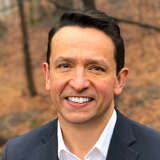Mr McDaniel and Dr Consuelos discussed the likely long-term impact of and lessons for the healthcare industry from the COVID-19 pandemic.
“I’m intrigued and compelled by what I think of as this dynamic duopoly, that we’re dealing with what we call the ‘culture of &’—the culture of doing 2 things well simultaneously: the need to focus on the virus and on the economy, the need to focus on the now and to prepare for the future, and in all of those contexts, be really focused on high reliability,” Mr McDaniel said.
Defining reliability as the interdependency between business achievement and service, he said that despite discussing the business of care, he has a firsthand understanding of the human pain of COVID-19 and cancer; his son was diagnosed with lung cancer at age 28.
Regarding the United States’ overdependence on global supply chains, Mr McDaniel said the inevitable future push to buy American is more than a nationalist mantra.
“This really gets at the heart of ensuring that we are bulletproof for the future,” he noted, adding that deregulating manufacturing and allowing for innovation will also help.
With many medical practices being small businesses, it is important to consider their future viability. Mr McDaniel cited the Centers for Medicare & Medicaid Services’ CARES Act, which allows for advance payments and the expanded coverage of telehealth under the recently passed coronavirus relief bill.
“On the technology front, telehealth has become table stakes, and we all talk about payment as a regulatory force, but the lack of payment shouldn’t be a limiting factor in terms of access or innovation,” he said.
Going forward, the oncology community must become less reliant on institutions and more reliant on a holistic ecosystem.
Ask yourself, “If we can so easily deregulate to solve these critical patient problems, why do we need the regulations in the first place, and how much of the regulatory infrastructure that is in place today hampered our ability to respond to this?” Mr McDaniel concluded.
Dr Consuelos is a cancer survivor who has worked in pandemic and emergency response for 20 years. He focused his talk on recovery, emphasizing that it is critical to learn from the pandemic and transform cancer care rather than simply return to how things were in the past.
“If we don’t change cancer care for the future, we may never recover to its former state,” he said, adding, “We do have a history of not learning from past events.”
Dr Consuelos cited the first coronavirus epidemic of SARS in 2003 and H1N1 in 2009, when shortages of personal protective equipment (PPE) arose. Although hospitals and corporations have since stockpiled PPE, it’s questionable whether the lesson was amply learned from those shortages in light of the current situation, he said. It is also important to realize that the virus does not observe boundaries.
“Many of our patients…are crossing state lines, yet our data, our response, our resourcing is continuing to observe those state lines,” Dr Consuelos said, citing the regional response called for by the Office of the Assistant Secretary for Preparedness and Response.
In terms of the long-term implications of the virus, he said that the birth of Generation P (pandemic) is occurring.
“Like every generation after a major event, the world will be changed forever,” Dr Consuelos noted.
He challenged attendees to consider identifying their role in improving readiness and recovery, as well as their next steps. Dr Consuelos encouraged healthcare experts to record in a journal lessons learned to take the necessary steps toward recovery in the future.




